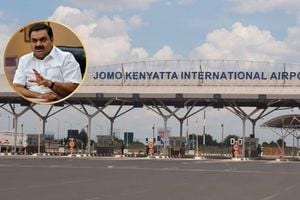
Indian billionaire Gautam Adani.
Adani Airport Holdings is targeting 30 acres near Jomo Kenyatta International Airport (JKIA) for commercial development, eyeing a five-star resort and other luxury businesses in its bid to take over operations of Kenya’s largest airport.
Adani has set aside 30 acres near JKIA for so-called city-side development (CSD), with 28 acres reserved for hospitality and two acres for retail, food, and beverage, according to a feasibility document supporting its takeover, viewed by Business Daily.
The airport arm of billionaire Gautam Adani’s sprawling Indian conglomerate outlined plans to build three hotels adjacent to JKIA: four- and five-star resort hotels with 250 and 200 rooms, respectively, as well as a three-star hotel with 150 rooms. Adani also plans a food and beverage zone with retail, according to the feasibility study.
“Adani Airports aims to create unique and futuristic facilities and explore the development of concepts such as Hospitality district, World Class Retail and placemaking initiatives such as Mixed Use development,” the report reads. “The focus will be also on offering diverse eclectic choices in food and beverages options catering to various cuisines and occasions”
Adani made a play for JKIA earlier this year through a privately-initiated proposal under which it would run the airport under concession for 30 years.
The company aims to generate an 18 percent annual return through its $1.85 billion (Sh 246 billion) investment, which includes spending $750 million on a new terminal building, associated apron and taxiway system, and two rapid exit taxiways.
The Indian firm’s deal for JKIA has come under fierce opposition, including from airport workers, and has been challenged in the courts as unconstitutional.
Alongside airport operations, it has become clear that Adani has ambitious plans for commercial development adjacent to JKIA—including taking advantage of the airport’s proximity to Nairobi National Park.
“Since Kenya tourism is largely dependent on nature and wildlife sanctuaries, the proposed hospitality and leisure segment shall mostly be positioned and developed as resorts,” Adani detailed. “The expansion of JKIA’s infrastructure not only enhances Kenya’s attractiveness as a tourism destination but also stimulates ancillary industries such as hospitality, transportation, and retail.”
Read: How corrupt officials milked 1996 dream for JKIA to benchmark Atlanta airport to make a killing
While Adani has disclosed plans for the three hotels as well as retail and food space, the group outlined a potentially much broader scope for city-side development, including convention centres, commercial office space, smart warehousing, healthcare, and film production sites.
The terms of Adani’s city-side proposal are skewed favourably toward the airport operator, with all revenues accrued from commercial development to be appropriated by the company. Revenue from airport operations, by comparison, will be remitted to the Kenya Airports Authority through both a fixed concession fee and a variable payout structure correlating with airport earnings, according to Adani’s proposal.
Adani may enter into contracts with any person in connection to commercial development, and any termination of the overall airport concession will not affect the city-side development concessions and related contracts, the feasibility study outlines. Moreover, Adani will have the right to sublease assets forming part of its development.
Meanwhile, Adani’s proposal mandates that the Kenyan government and KAA will take on the burden of land acquisition related to city-side development at no additional cost to the Indian firm, and maintain responsibility for litigation related to land acquisition.









